Know Before You Go: African Safari Tips for Your First Trip
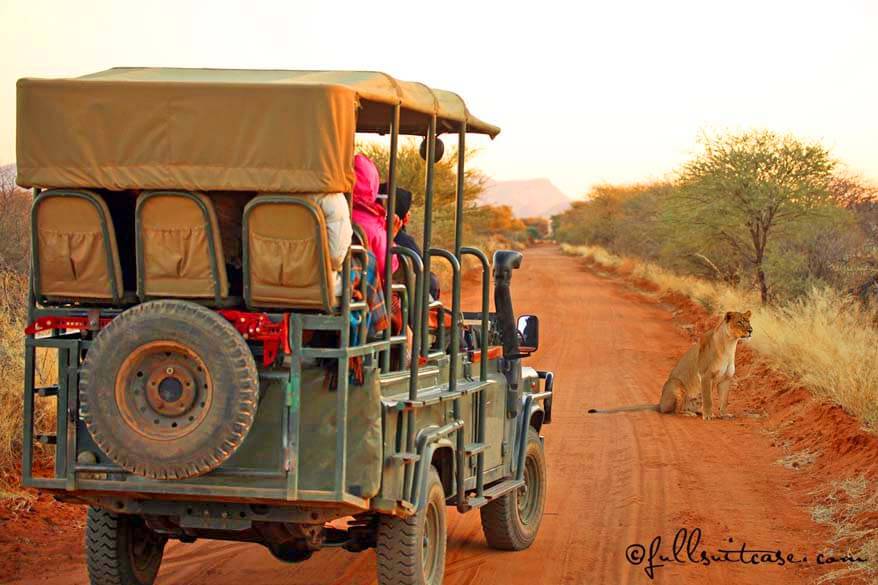
This site contains affiliate links, which means that we may earn a small commission, at no cost to you, for qualifying purchases. It supports the work that goes into keeping this content free. Thanks for reading! More info: Privacy Policy.
Planning your first African safari? This guide covers all the essential safari tips and everything you need to know before you go.
You’ll find advice on planning tips, what to pack (and what to leave at home), health and safety basics, photography and tipping etiquette, plus the pros and cons of guided vs. self-drive safaris. We’ve also included family-friendly tips and the most common mistakes first-timers make.
Good to know: These aren’t just generic safari tips – they’re based on our own experiences from multiple safaris in Africa. Real lessons, real mistakes, and practical advice to help you feel prepared, know what to expect, and make the most of your once-in-a-lifetime safari adventure.
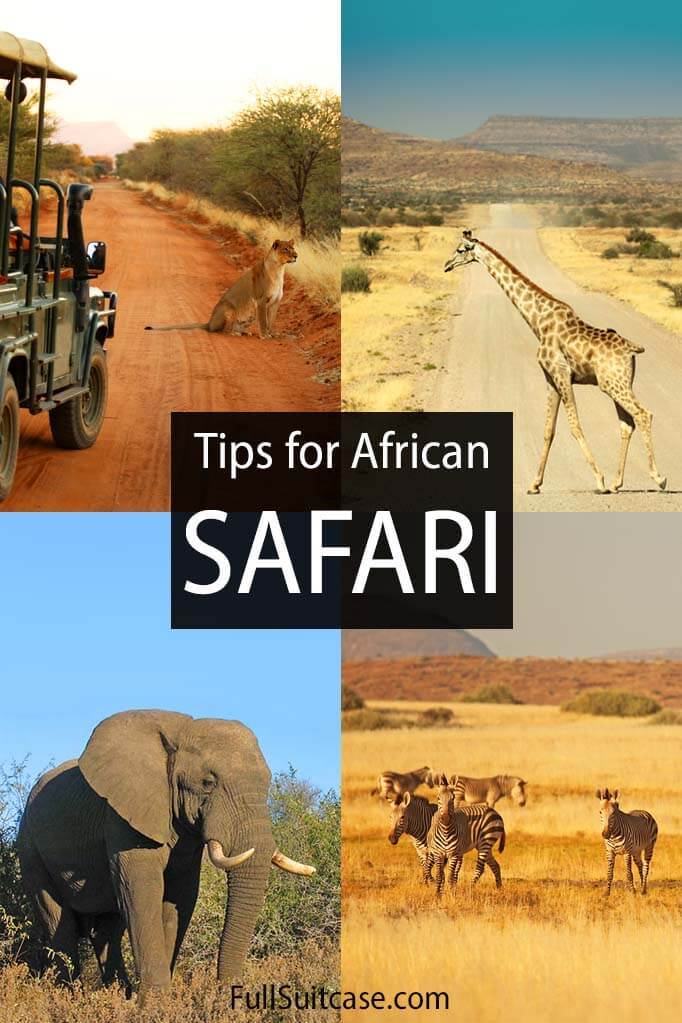
Before You Go
Choosing Where and When to Go
There are incredible safari destinations all over Africa: South Africa, Kenya, Tanzania, Botswana, Namibia, Zimbabwe, and more. Your choice depends on the time of year, budget, and how much time you have.
- Best time for wildlife viewing: Usually the dry season (May–October in Southern Africa; June–October in East Africa).
- Wet season safaris: Fewer crowds, lower prices, and lush scenery, but sometimes harder to spot animals.
TIP: Don’t try to do too many countries in one trip. It’s better to spend a few days in one or two parks than to rush across half the continent.
How Long to Stay
A common mistake is underestimating how much time you’ll want on safari. A single game drive might not show you much, while the next could be full of lions and elephants. On the other hand, waking up before dawn and sitting in a dusty jeep for days is not everyone’s idea of a dream vacation.
- Minimum: 2–3 nights per major national park.
- Ideal safari duration: 5-7 days, split between two or maximum three different parks or lodges for variety.
TIP: A week is usually plenty for a memorable safari experience, but plan a longer trip if you also want to explore your destination beyond game drives. For example, combine a safari with sightseeing and road tripping. See our South Africa itinerary and Namibia itinerary for some inspiration.
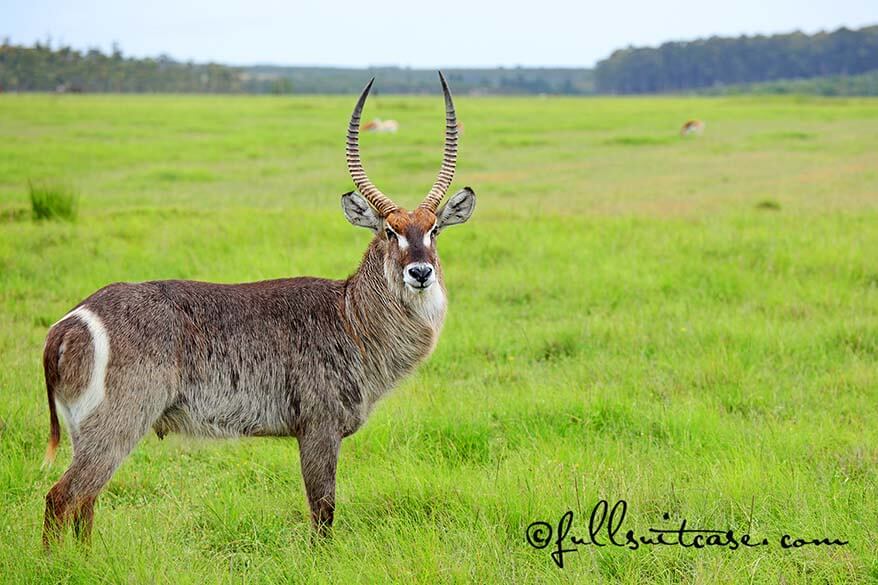
Health, Vaccines, and Insurance
- Check requirements for yellow fever, malaria medication, and routine vaccines before you even choose your safari destination.
- Always bring a small first-aid kit (stomach meds, insect bite cream, antihistamines, painkillers).
- Get comprehensive travel insurance that covers medical evacuation.
TIP: If you want a malaria-free safari experience, look at smaller parks in the southern part of South Africa. Some areas of Kruger National Park (South Africa) and Etosha National Park (Namibia) are also considered low risk during certain times of the year. For example, we visited both in July–August (their winter/dry season) and didn’t need malaria medication. Always double-check the latest health advice before your trip, as conditions can change.
Do You Need to Take Small Planes?
Not everyone is comfortable flying in 10–12 seater planes. The good news is you don’t always have to — many incredible safari destinations can be reached without small aircraft. It all depends on where you’re going and which parks or lodges you choose to visit.
- Self-drive safaris are really easy to do, especially in South Africa and Namibia.
- Overland transfers are available between many parks in Kenya and Tanzania (though longer).
- Private drivers are an option if you don’t want to fly.
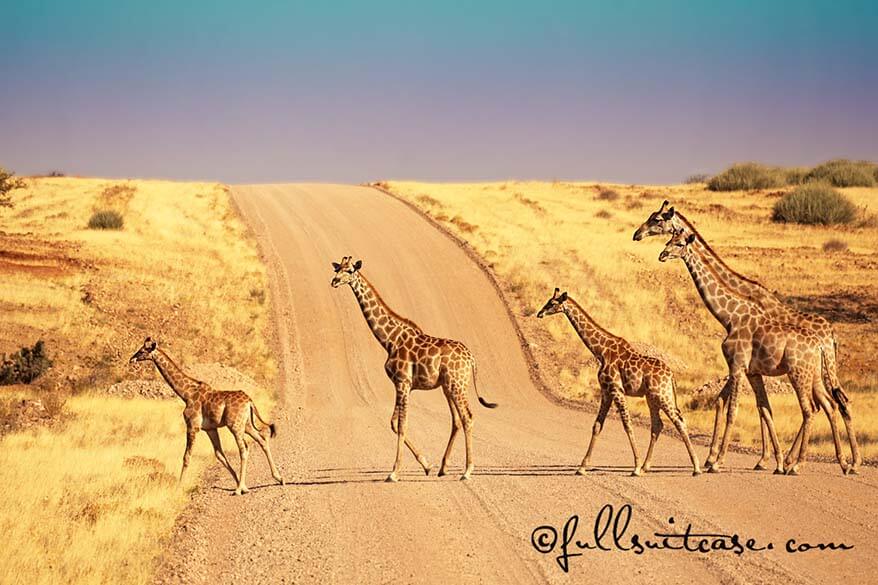
Guided vs. Self-Drive Safari
We’ve done numerous safaris, sometimes with a guide and sometimes on our own. My advice? Try both if you can. Neither guarantees you’ll see more animals (luck always plays a big role), but each offers its own advantages:
Guided Safaris
- Better visibility: Open vehicles sit higher and have no windows, giving you clearer views.
- No stress: You can relax while someone else drives, navigates, and handles park rules.
- Local knowledge: Guides know animal behavior and often spot things you’d miss. They also stay in contact with other guides, which means you can be at the right place at the right time when something exciting happens.
- Family-friendly: Kids and teens usually stay more engaged in an open safari jeep with a local guide than in your own car. Give them binoculars and make a spotting game out of it.
- Special experiences: Guided drives often include bush breakfasts, picnic lunches, or sundowners in the savannah – highlights you can’t easily organize on your own.
- Night drives: Only available with a guide, since self-drives aren’t allowed after dark in most parks. Don’t expect great photos at night, but hearing lions roar in the dark is unforgettable.
PRO TIPS: When booking a game drive, check the duration, group size, and departure time. Early mornings and late afternoons usually offer the best wildlife viewing, but don’t skip midday drives – we’ve seen lions, leopards, and rhinos in the heat of the day, too. Try a night drive at least once for the atmosphere. And most importantly, don’t hesitate to ask your guide to stop if you spot something or want another photo – that’s exactly what they’re there for.
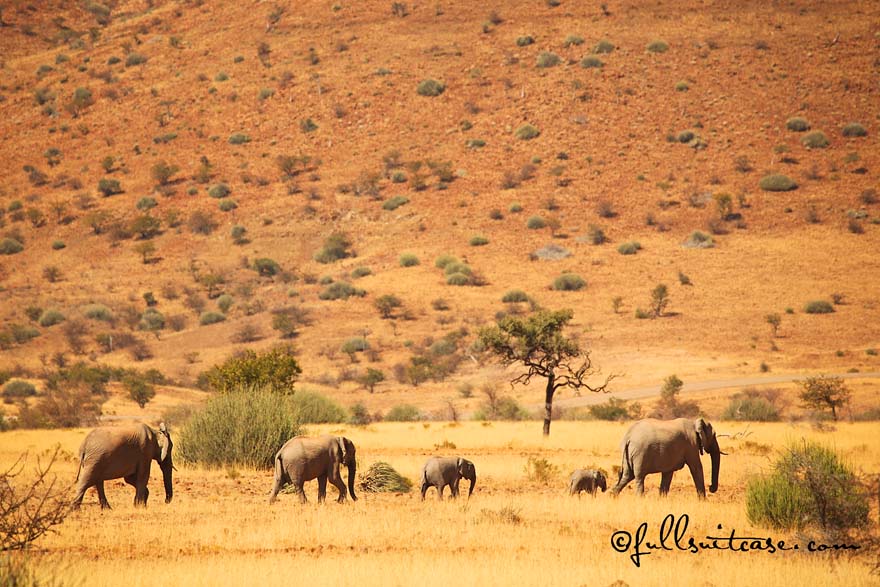
Self-Drive Safaris
- More flexibility: You choose when to stop, how long to stay with an animal, and when to move on.
- Photography advantage: No competing with others in the vehicle for the best angle.
- Budget-friendly: Self-driving is usually much cheaper than guided tours.
- Comfort control: You have air-conditioning and heating in your own car – something you’ll appreciate when it’s freezing at sunrise or blazing hot at midday.
- No age limits: Many guided safaris don’t allow young children for safety reasons. On a self-drive, you can bring kids of any age.
- Easier with little ones: You can play music, stop whenever you need to, and keep plenty of snacks on hand – all of which makes self-drives easier with younger kids. Just remember to keep noise down and windows closed, especially if there are big cats nearby.
Good to know: If you are looking for a self-drive safari, check the rules for the specific parks you plan to visit. Many private reserves don’t allow self-driving at all, and many major parks don’t allow private vehicles on certain roads. Always stick to the local regulations to keep both you and the wildlife safe.
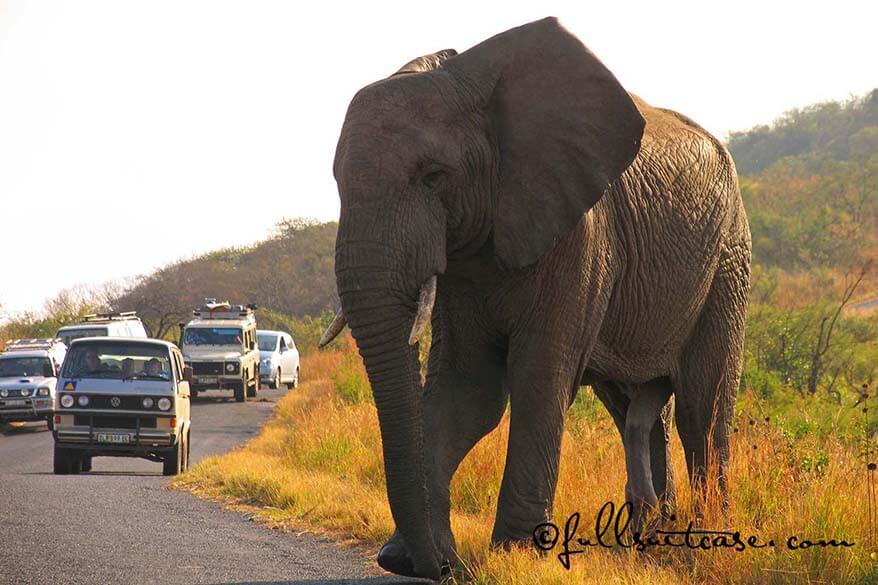
What to Expect
An African safari is unlike any other trip. Expect long hours in open vehicles on bumpy roads, often waking before sunrise or returning after dark. Some drives deliver lions, elephants, or rhinos within minutes, while others can feel quiet and uneventful – patience is part of the experience.
Be ready for heat and cold, wind and dust, mosquitoes and flies, and the occasional very rough ride. Not every moment will be a highlight, and there will be stretches with little to see. But those big sightings make it all worthwhile.
Most lodges and camps follow a set rhythm: early morning and late afternoon game drives with downtime in between. Camps are often remote, with limited Wi-Fi, solar power, and pitch-dark nights filled with animal sounds – part of the adventure.
Typical day at safari lodges:
- Early mornings: Drives usually leave before sunrise, often before breakfast.
- Midday: Animals rest, and so do you – relax at camp or by the pool.
- Afternoons: Another game drive until sunset.
- Evenings: Dinner, stories by the fire, and sometimes a night drive.
What to Pack for Safari
Packing for safari isn’t about style – it’s about practicality and comfort. Also, if you forget something, you won’t be able to easily buy it in the wilderness. So check our tips below to be sure not to forget any essentials.
Clothing & Layers
Safari clothing essentials:
- Windproof jacket.
- 1-2 sweaters.
- 1-2 long pants.
- Shorts or convertible pants.
- T-shirts/shirts for a week.
- Hat with brim
- Swimsuit (lodges often have pools)
- Closed shoes.
You might want to pack one smarter outfit for dinner, but it’s rarely necessary in Africa. Even in luxury lodges, most guests dress casually in jeans, shirts, or light sweaters in the evenings.
PRO TIP: Bring layers: early mornings and evenings can be freezing (literally), even if afternoons are hot.
COLORS: Neutral tones like khaki, beige, and olive are practical, but don’t worry if you don’t have them. Just avoid camouflage (illegal in some countries) and bright neon colors. We’ve seen plenty of people on safari in pink, red, white, or orange jackets. I even wore a red jacket myself several times – it was simply the lightest one to pack, and since I only used it when it was cold (and therefore dark), the color didn’t matter.
Good to know: Most safari lodges offer laundry service (sometimes even included), so you don’t need to pack as many clothes as you think.
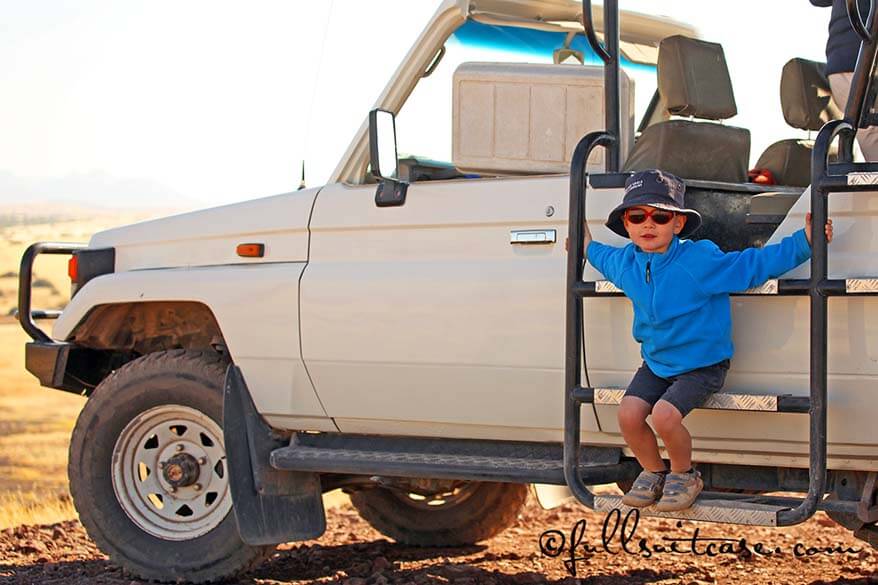
Gear You’ll Actually Use
- Binoculars: An absolute must for everyone on safari. We always bring the best pair we own – with image stabilization. And we also pack inexpensive but decent binoculars for each of our kids. It keeps them engaged and makes the drives much more fun for them.
- Smartphone: Handy for landscape photos, wake-up alarms, a flashlight, and much more.
- Flashlight: Camps are very dark at night, and a phone flashlight isn’t always enough. If you’re camping, bring a headlamp – it keeps your hands free.
- Adapters: South Africa/Namibia use D/M plugs; Kenya/Uganda – type G. Botswana, Zimbabwe, and Tanzania either type D or G.
- Camera and zoom lens (200mm minimum): Take more memory cards and batteries than you think. A tripod is optional but is essential for low-light wildlife photography. For more info, see our guide to the best camera equipment for safari photography.
Good to know: Camps often run on solar power. Charging space can be limited, so it’s best to bring multi-plug outlets and a power bank. Don’t forget the right cables!
PRO TIP: Make sure to charge all your devices and camera batteries every time you get a chance!
READ ALSO: Best Camera Gear for Safari + Travel Photography Tips
Comfort & Health
- Mosquito repellent (with DEET).
- Medicine – pack basics like a first-aid kit, pain relief, stomach remedies, and motion sickness tablets (small plane and safari rides can be bumpy!).
- Sunscreen & sunglasses.
- Snacks and water (especially with kids).
- Small backpack for game drives (make sure it closes well, otherwise you’ll have sand over everything).
- Large trash bags and ziplock bags: Useful for covering backpacks, luggage, and camera gear during dusty drives.
PRO TIP: Safaris are tough on luggage – everything gets dusty fast. So leave your brand-new designer suitcase at home and bring soft-sided bags instead. Hard-shell cases aren’t allowed on small planes and are often impractical for group tours.
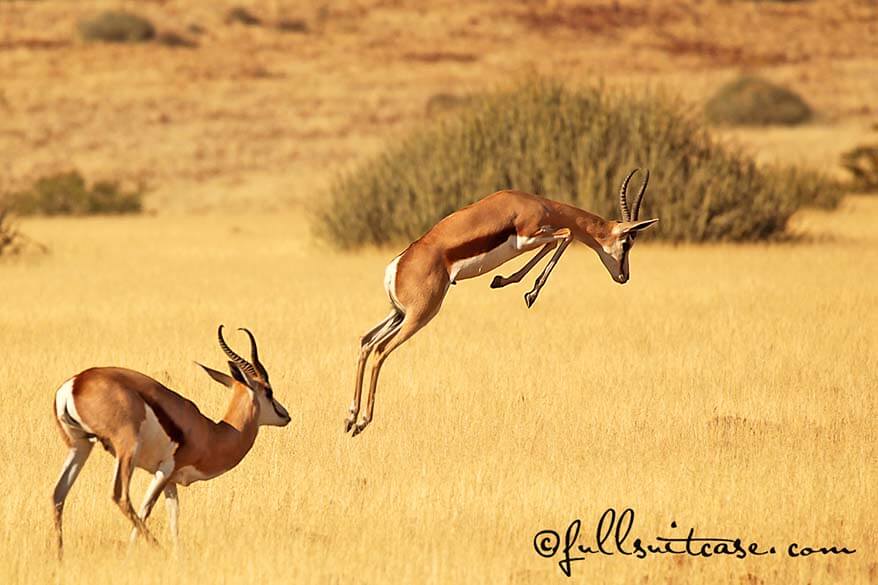
What NOT To Pack
You need a lot less than you think. Here are a few things you may want to leave at home when packing for safari:
- Heavy jewelry and valuables – they are easy to lose, unnecessary in the bush, and only add stress.
- Hair dryers or high-wattage appliances. Many safari lodges run on solar power and can’t handle them.
- Hard-shell suitcases. Impractical and often not allowed on small planes.
- Camouflage clothing – illegal in some African countries, as it’s reserved for the military.
- Bright neon outfits – they attract unwanted attention from insects and animals alike.
- Fancy clothing, high-heeled shoes, etc.
TIP: Keep it light, practical, and easy to carry.
Extra Safari Tips
Here are some additional tips you should know when planning a safari trip:
Safety Basics
- Stay inside the vehicle – animals are better camouflaged than you think.
- Keep your hands and cameras inside the car.
- Don’t make sudden movements or loud noises.
- Never stand between hippos and water. Hippos are the most dangerous African animals (not counting mosquitoes)!
Tipping Etiquette
Tipping practices vary, but here are some general guidelines:
- Guides: $10–20 per person per day.
- Trackers/drivers: $5–10 per person per day.
- Camp staff: A shared tip box, around $5–10 per guest per day.
PRO TIP: Always tip in local currency or USD, and hand it over in an envelope if possible.
Photography & Tech Tips
- Dust is your biggest enemy – bring lens wipes and ziplock bags.
- Charge whenever you can. Power isn’t always 24/7.
- Don’t spend the whole drive behind the camera – some moments are better just to watch.
PRO TIP: Take photos whenever you can. You might spot rare animals on your first drive and assume it’s always like that, but every sighting could be your only one.
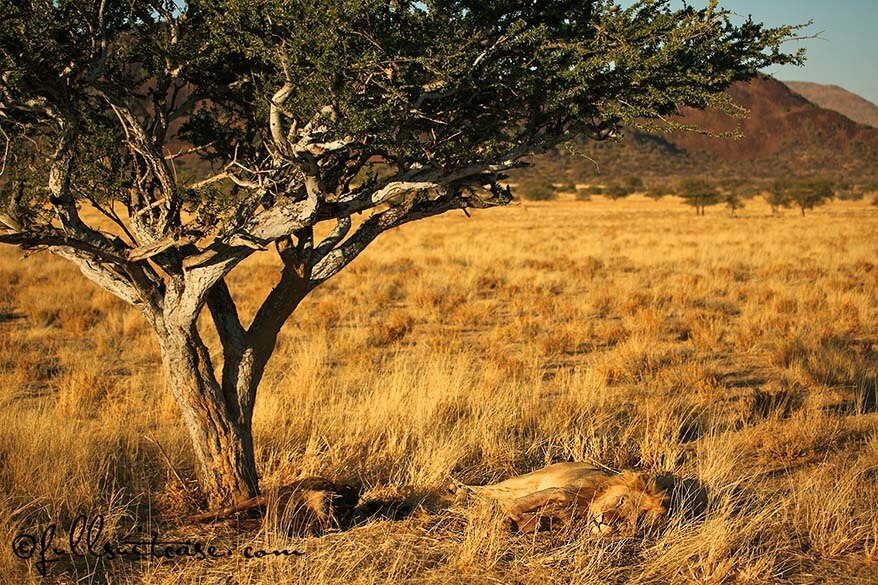
Family Safari Tips
Visiting Africa with children? Here are some things you may want to know when planning a safari experience:
- Best age: Kids around 8+ usually get the most out of a safari, but younger children can enjoy it too. We took our own kids on game drives when they were still in preschool, and they loved the experience. Years later, they still remember some moments from those early trips!
- Choose malaria-free destinations: Easier and less stressful with young kids.
- Pick family-friendly lodges: Look for camps with kids’ programs, shorter drives, or swimming pools for downtime.
- Keep them engaged: Give them binoculars, a checklist of animals, or play “who spots first.”
- Bring snacks & patience: Drives can be long, and not every hour will be exciting.
- Pack entertainment for downtime: Books, cards, or small games help during camp breaks and travel days.
- Check age restrictions: Some lodges or shared drives don’t allow young kids; a private vehicle may be required.
- Teach safety early: Make sure kids understand the basics (no loud noises, no leaning out of vehicles).
- Involve them in planning: Let older kids choose an activity, lodge, or animal they want to see – it keeps them excited.
Good to know: Some lodges have minimum age limits, and many don’t allow young children on shared game drives. In some cases, you can book a private vehicle instead. If you’re planning an African safari with kids, be sure to research family policies in advance.
PRO TIP: For more family tips, please see our guide with everything you may want to know before taking kids on safari in Africa.
Common Safari Mistakes to Avoid
Here are some of the most common mistakes first-time safari travelers make:
- Expecting non-stop action: Safaris involve waiting and patience.
- Skipping health prep: Don’t overlook vaccines, malaria medication, or a small first-aid kit.
- Not allowing enough time: One safari ride isn’t enough; you’ll wish you had stayed longer.
- Overpacking: Stick to soft-sided bags and keep it light. Often, you can get your laundry done at the lodges (and it’s not expensive).
- Ignoring luggage restrictions: Small planes and group tours often have strict weight and bag size limits.
- Packing fancy clothes or expensive luggage: Dust, heat, and bumpy roads don’t mix well with designer gear.
- Forgetting snacks and water: Drives can be long, and you won’t always stop when you’d like.
- Wearing camouflage: Illegal in several African countries and best avoided altogether.
- Neglecting sun and insect protection: Sunscreen, hats, and repellent are absolute essentials.
- Forgetting cash for tips: Many lodges rely on tips, and ATMs can be hard to find in remote areas.
- Assuming safaris aren’t for kids: Children can love it with the right planning – binoculars, games, and kid-friendly lodges help.
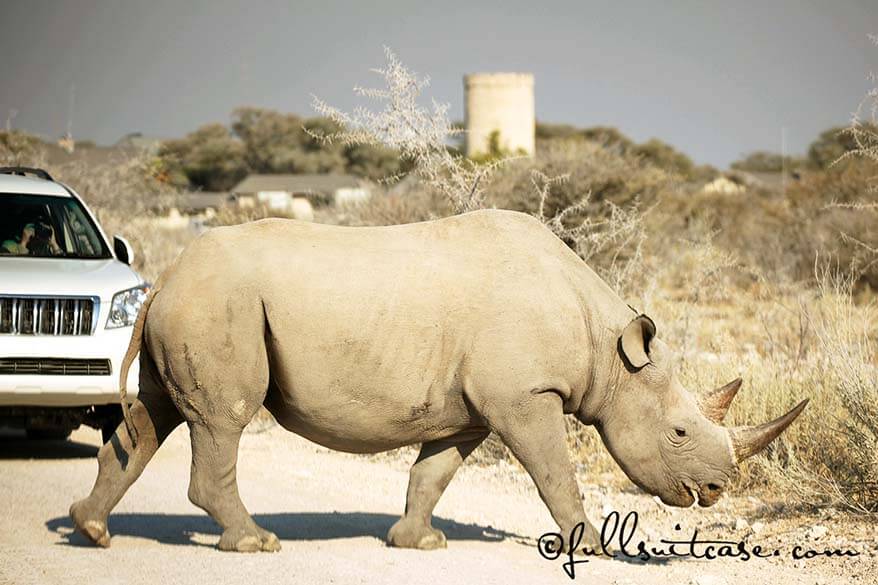
Final Thoughts
An African safari is truly unforgettable, but it isn’t always glamorous. Expect dust, early mornings, insects, and bumpy rides… and then, out of nowhere, you’ll be watching lions hunt or elephants crossing just meters away. Those moments make everything worthwhile.
Go with realistic expectations, pack smart, and embrace the unpredictability. The better prepared you are, the more rewarding your safari will be.
And one last tip: Go on every game drive you can. We almost skipped our last night’s drive after four weeks in Namibia, but that night we spotted a pangolin (incredibly rare) and a pair of lions with their prey – unforgettable sightings we would have missed if we’d stayed at camp.
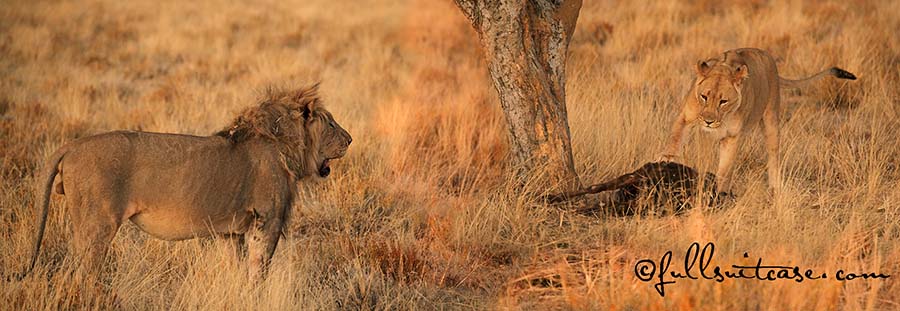
More travel inspiration & tips for Africa:
- Best Things to Do in South Africa
- South Africa Itinerary
- South Africa with Kids
- Best Places to See in Namibia
- Namibia Itinerary
- Namibia with Kids
- Namibia Travel Tips
- What to Pack for Namibia
- Safari with Kids
TIP: Did you find this guide helpful? Bookmark this post for later, share it with your friends, and save it to Pinterest to inspire your next trip.
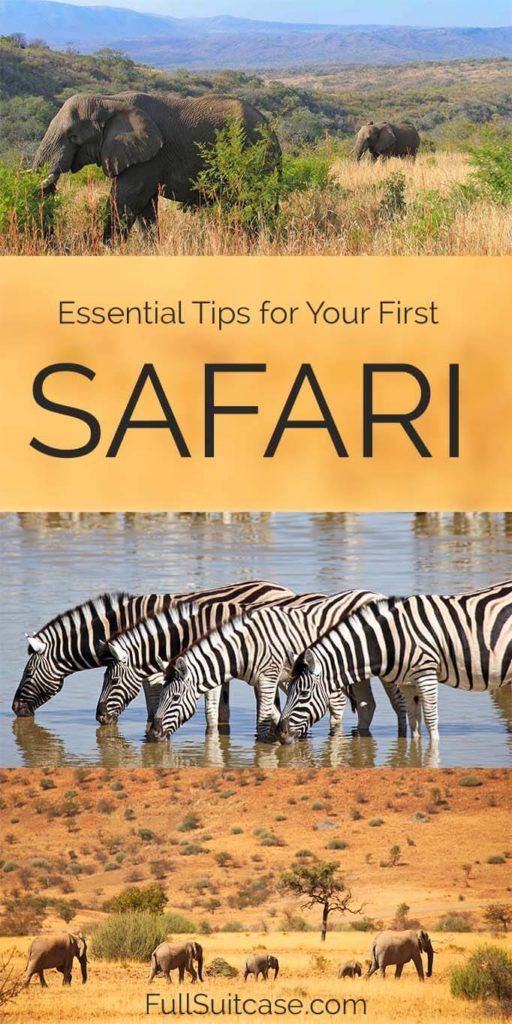
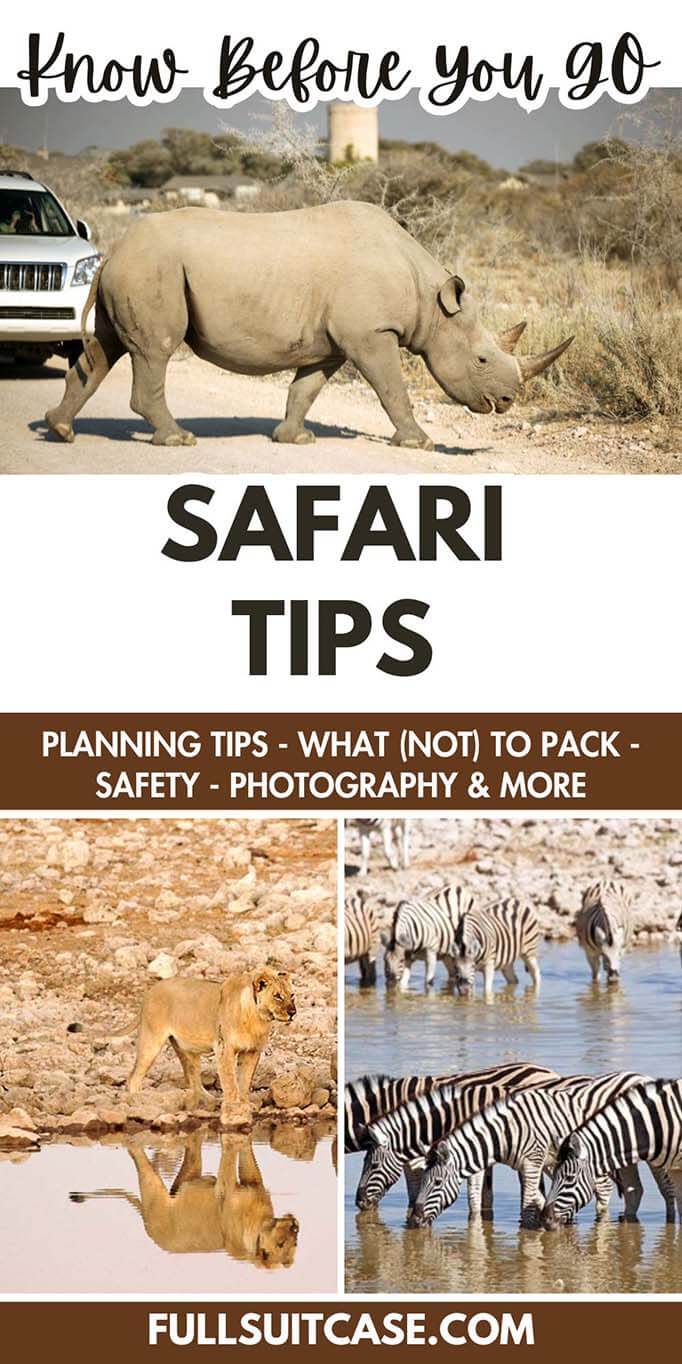

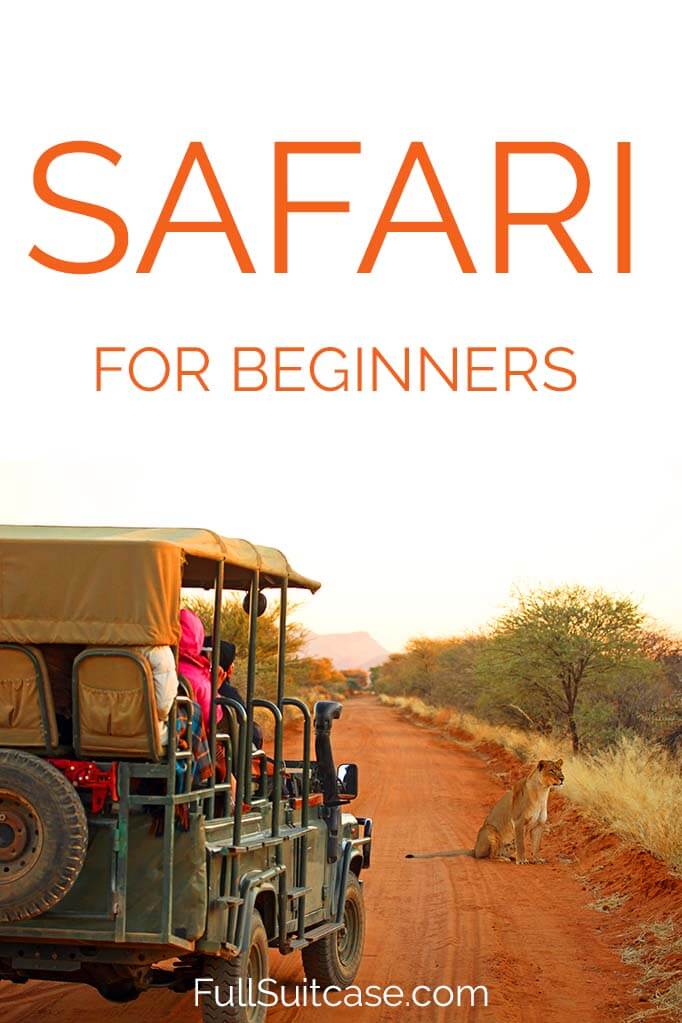
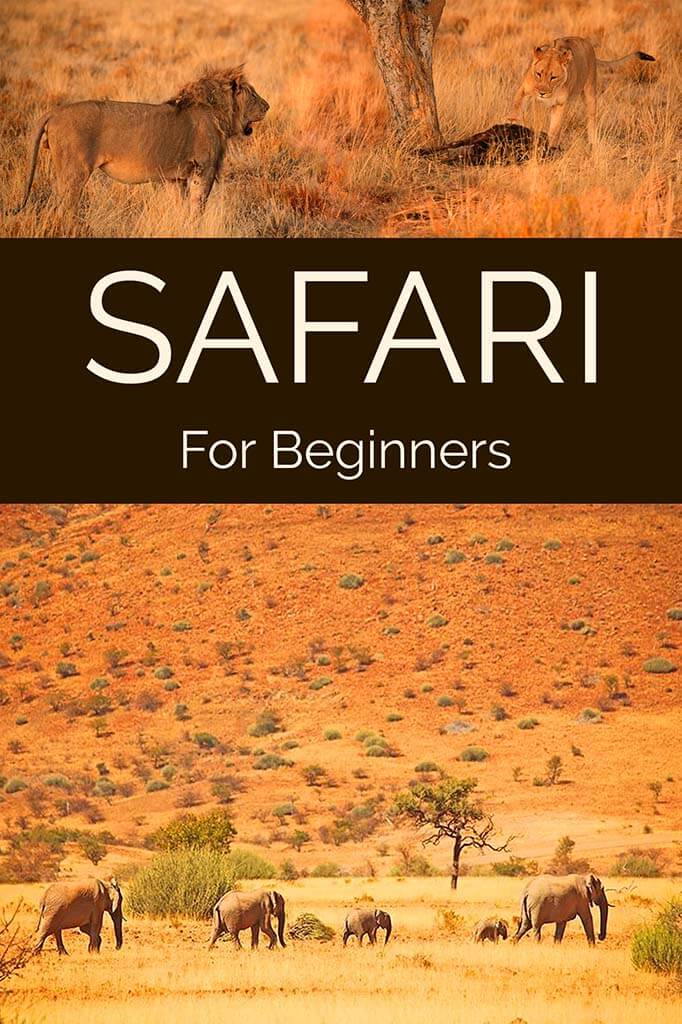

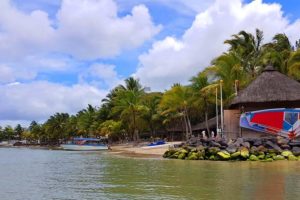

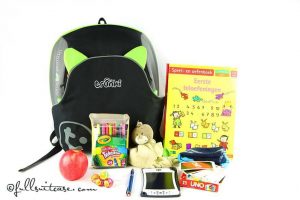
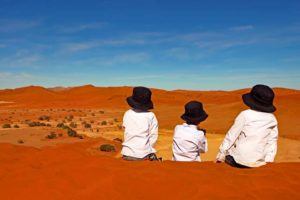
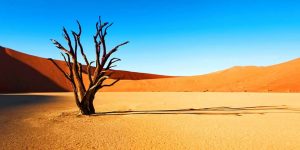

Really helpful, thank you. We are off to Kruger in August x
Glad to help, Pol. Have a great trip!
Thank you so much for sharing all these precious tips to prepare foe a safari. I’ll be going to Kenya in mid-September 2024 and I have started to prepare mentally fort this trip. So your tips are greatly appreciated.
Glad to help, Suzanne. It will be an amazing trip for sure!
That was great!! So many good tips to know about. Thank you!
Glad to help. Enjoy your trip!
One of the best summaries I have read. Our safari has been cancelled twice due to Covid so looking forward to the tour later this year (2022).
Fingers crossed you can finally make it happen this year, Martha! Have a great trip!
Thank you for sharing this information. I am a tour operator in Uganda and this info is also applicable for safaris here.
Except I would emphasize neutral colors more and staying away from red as some animals see red as blood and may charge.
Thanks for sharing your experience, Simon.
As a south African and experienced Bush traveller your advice is spot on. Well done. The Bush is a life changing experience. The smell of a citronella candle will linger for years.
Thanks for this, Geoff. We always try to provide no-nonsense really useful advice to our readers!
Thank you so much to share this article and all the information which should keep in mind for the safari. I now feel better prepared for our trip to Kenya next summer.
Glad to hear you found it useful, Ken. Enjoy your trip!
Thank you for your wonderful post. Full of information that got my blood running with excitement for our 17 day trip to Kenya this July-August. I see now that I need a new camera … ugh $$$$ but your right it, if not now?? Looking at the EOS 80D DSLR bundle on Amazon or should I try a local camera store? I live in a very small town in Northern CA so I have few local choices.
I haven’t bought my plane ticket, prices go up and down, but have reserved a tour space with a small experienced group. How far in advance should I book, and any recommended airlines? They all seem expensive for my travel times. Thank you and I will continue to follow your blogs..
Hi Rebecca, we have some tips for camera equipment in this article (best camera and lens for safari). And yes, buying it online will often be much cheaper. Just one thing, I wouldn’t get such a camera just for one trip, unless you’ll also use it afterwards. Also, EOS 80D will require good lenses, so that’s an extra cost… It’s hard for me to advise, of course, not knowing your photography level or needs…
As for the plane tickets, I’d get them asap – your travel dates are fixed, so that leaves you with very little flexibility. My experience is that they just become more expensive as time passes. One thing – make sure that you clear all cookies on your browser or use incognito window when searching for flights. Otherwise, you’ll definitely overpay. By placing cookies on your computer, airlines know that you are interested in those specific flights for those dates and they’ll show you a higher price every time you look.
What also helps sometimes is look for flights from alternative airports near you.
Hope this helps. Enjoy your trip!
I never knew that camouflage clothing is forbidden in some African countries. Our family is planning to go to Namibia for a safari next year and need to find the safe tours.
Hi Taylor, I don’t think there are any ‘safe’ or ‘unsafe’ tours. Namibia is amazing and we never felt unsafe anywhere there. There isn’t that much to research, actually. Most lodges organize sundowner safari drives and e.g. in Etosha, you can just go on safari on your own without any tour. Just follow the signs and don’t get out of the car in the areas where it’s forbidden, because you can never be sure that there aren’t any dangerous animals nearby.
Happy travels!
Hellow rafiki, thank you for your information,, i agree that Africa is a good place for visiting it have many attractions,when you visit u will enjoy
Just booked my first safari (& trip to Africa) as a surprise for my husband’s 6oth. So excited but not that sure what to expect & certainly not what to pack so thanks so much for this. Very useful.
Glad to hear that, Nikki. And – you’ll absolutely love Africa. Enjoy it!
Love your photos! Unique shots and beautiful. Thank you for the article.
Thank you for taking the time to leave this feedback, Acacia. Enjoy your trip!
I live in Africa and this is all you need to know whether for guided safaris or self drive safaris. For clothing carry a variety because weather changes and after the tiring safari activities you may need to relax. All foods and drinks can be gotten from the restaurants and cafes so no need to worry. Just plan right and have fun
Thank you for the local’s perspective, Samuel. It’s good to know we have it all covered!
Thank you for an awsome blog! I have been in Safaris on my own in Kenya and Tanzania but never in Southern Africa. I am now starting to plan a Safari with the family (wife + 3 kids age 17, 14, 8) from 20 to 28 April. They have never been on a Safari, but are adaptable, expeirenced travellers. Given the time of the year, I was thinking Southern rather than East Africa. What parks do you reccommend, and which country, South Africa, Botswana, Namibia, ….? I have never been to South Africa so wanted to also visit Cape Town if it made sense, but I know we might not have much time. What would you recommend, to make the most of the time we have? Thanks a lot!
Hi Alberto, I really don’t know what to say as April is still rainy season in those areas. But since the roads in Kruger NP, South Africa, are paved, I think it’s always a good choice, no matter the season.
You could consider flying to Johannesburg, drive to Kruger (+-6hrs), then spend 3-4 days there. Drive back to Johannesburg, fly to Cape Town, and spend the rest of your vacation there. 8 days is really short, but I guess it would be doable. Here you can find our South Africa itinerary for 2 weeks, it might give you some ideas how to best plan your time.
Alternatively, if safari isn’t your main focus, fly to Cape Town and drive the whole Garden Route. April is a beautiful time to visit there! End your trip in Addo Elephant NP with a few days of safari. There are also some private game reserves along the Garden Route, so you could include a few additional game drives in your itinerary as well. I have some suggestions for that area in this post: South Africa with kids. You could fly out of Port Elizabeth airport, which would save you the trouble of having to drive back to Cape Town.
These are just a few ideas, of course, and there are many more options. Hope this helps.
I enjoy the information on preparing for an African safari trip. I agree that it is important to identify that not every single waking moment will be this amazing trip, someday it will just be boring driving. I would think that there are a lot of dull parts of Africa, but overall it is an amazing experience and one that you will remember.
Agree, African safari trips are amazing, if you know what to expect and are open-minded enough to take everything as it is.
Hi Jurga. First of all, thanks for all of thoses tips. My best friend and I are going to Kenya in november. We’re planning to do a safari in Masai Mara and Amboseli. Should we book before leaving or wait to be there and find something with locals?
Hi Daphne, I don’t know exactly what you mean? Book the safari rides themselves? Are you driving to those parks on your own?
If you are driving, then I guess you can just book the safari rides at your accommodation inside or near the park. I don’t have experience with this, but that’s how it works in Namibia or South Africa. You don’t have to book the rides for specific days in advance.
However, I know that most people traveling to Kenya for a safari experience actually book the whole trip upfront. So you look for a company that does the tour including the car with a driver, the hotels, and all the safari drives. I haven’t met anyone who has travelled in Kenya with a rental car; everyone I know was there with a private tour like I described, so all the planning and booking is indeed done upfront.
Sorry I can’t help you more.
Hi Jura, my adult daughter and I are wanting to go on a safari trip. Where would you suggest we go and what time of year would you recommend please? I’m not hugely able to walk far and also would prefer to be in a lodge rather than roughing it camping.
Thank you so much for any help you can give. I’ve made notes on all your hints and tips which are great.
Hi Pauline, there are so many choices when it comes to safari… If safari is the only thing that interests you (so no other sightseeing like e.g. in Namibia or South Africa), then one of the best destinations is probably Tanzania. Kenya is also a good option, probably a bit cheaper…
There are so many companies organising trips, you can book private tours, small group tours, etc. Small group tours are best price/quality wise and you don’t have to do much planning. Try and research some local tour operators; usually you can choose what type of accommodations you want to stay at, etc, but it requires more planning.
Hope this helps a bit.
Hello Jurga. I’ve been to South Africa, Kruger Park, Cape Town and Johannesburg with family and we rented a car for all our driving in June. But now I’d like to go back on my own from USA! I’d be traveling on my own as a senior female (72!) in excellent health and stamina. I won’t be driving on my own. I definitely want to stay two weeks minimum and see as much as possible, mainly safari. What time of year and what do you suggest as far as getting from place to place and safari parks? I want to make the most of a magical place. What do you think?
Thanks!
Hi Allie, I think a lot depends on where you go. But in general dry season is best for wildlife viewing as there is less vegetation to hide and animals go looking for water at the waterholes, etc. The best season for safari in Africa is therefore probably anywhere from May to October.
Hi Jurga, enjoyed reading all the information and a bit about your personal account. Springbok’s photo is amazing. Watching those wild animals stirs something deep inside the heart, we saw tigers in December and can recall every detail. You have put together all the information in such concise manner, thank you. We are considering South Africa and Namibia during summer break. Everything seems very exciting except those pesky insects, I had a painful experience with sandflies in NZ. What months would you recommend out of June, July, and August? Do you think one month will be fair for both these countries? Do you recommend any safari company? I guess I have asked many questions. Thank you so much for your time.
Hi Binny, we visited South Africa in July once and only saw very few mosquitoes in Kruger NP. The rest of the country was too cold for that. Same in Namibia – we went in July and didn’t really have any issues apart from a few mosquitoes in Etosha NP. No annoying flies like in Australia’s Red Centre where they crawl in your ears and nose 🙂 I think any of the winter months (June-August) will be the same.
I don’t really have a safari company recommendation since we did a self drive trip in both countries.
Firstly. What an awesome blog. As a South African whom has been going on safari all her life, you covered many points necessary with great insight!
To Nerissa,
I hope that you enjoy your time in our beautiful country.
With regards to Malaria, Kruger is not high risk, however, there is always a low risk in the north near mozambique.
Mosquito repellent is readily available i would suggest tabard if you are buying such in south africa. The weather will generally be hot and with a few storms if you are lucky.
Kruger is a magical place, i would suggest booking a night drive with the park.
Please do not get oit your vehicle, the animals can surprise you with how close they get. Especially monkeys and baboons who can be very brazen. And steal your food…
Good luck with the springbok, a very special animal, as Jurga mentioned, they are skittish and often dart off so you need to be quick/stealthy when you spot them!
Your drive to Cape Town will be beautiful as you see the complete changes in scenery as you travel. As a South African i advise to you to try not stop along the sides of the road. The petrol stations are equipped with ablutions and shops throughout the country. Keep car doors locked and just remain vigilant. Try not to converse with people begging etc at the traffic robots especially in jo’burg.
I trust you will love our country as much as we do!
Thanks for sharing all these tips. Insights by a local South African are very useful for our readers planning a trip to Africa.
The tips are so amazing with a lot of advice and I liked the way how you compare between self-guided and a tour drive and this is helpful for me whenever I plan for a safari in the future.
Thank you heaps for additional infos. I will take note everything you said and we will just stay in malaria free areas for safety reason. Just followed in Instagram ?. Safe travels!
What an amazing information and photos you have! We are planning to go on safari end of November up to beginning of December. We have a three year old daughter (she’ll be 3yrs 9ms at that time) and our worry is the malaria. On that dates/month I have mentioned, does she need a malaria pill if we go to Kruger? We might be renting a car from Joburg to Cape Town, is it safe to drive in SA? Thank you.
Hi Nerissa, from the information that I have, yes, Kruger is malaria area in that period. Talk to a doctor, I really cannot recommend what to do. I hear there are special malaria pills for kids, but we have no experience with that (always avoided malaria areas/seasons with kids). Good mosquito repellent is a must in any case!
As for driving. The first thing you see when you leave Johannesburg are numerous warning signs next to the road telling you that it’s a highly dangerous area and you should never stop, etc. So it definitely doesn’t feel safe there. But a few hours later you are in Kruger and you forget all about it. We never felt unsafe anywhere else, nor had any problems driving in South Africa. But, of course, you have to be careful and use common sense. Don’t leave any valuables in the car (better still, don’t even pack anything that is not absolutely necessary), just as you would do in other places I suppose. Don’t drive after dark (this has more to do with the animals, but also people walking on the roads, etc). In Kruger stay in the car at all times even if you think there are no animals nearby.
Hope this helps you a bit. Don’t worry too much, South Africa is an incredible country. You’ll love it!
I appreciate the information on preparing for an African safari trip. I agree that it is important to remember that not every single waking moment will be this amazing trip, sometime it will just be boring driving. I would imagine that there are a lot of boring parts of Africa, but overall it is an amazing experience and one that you will remember.
That’s definitely true, Ben. It wouldn’t be a true safari experience if you wouldn’t have to look for animals first, would it? 😉
This is super helpful! Africa is pretty high on my list of places to see, and this will definitely come in handy closer to that! I love the pictures, too!
Thanks for taking the time to leave a comment, Megan. Glad you found this post useful for your trip to Africa.
Hello. I´m Flavia Zenke and i`ll try to speak in english. I would likie to travel with my husband and my baby (three years old) in febrary to Kruger Park. My sun is very young to go in Safari? Thanks
Hi Flavia, It’s really difficult to say. First, Kruger Park is malaria area in February, so that’s something to consider when traveling with such a young child. Second, many organised tours will probably not take a 3 year old on safari rides. On the other hand, you can definitely visit Kruger with your own car with a child of any age, just keep the windows closed. 😉
If your travel plans are not fixed yet, you may want to consider the Southern part of South Africa which is malaria free. There are some private game reserves there and Ado Elephant National Park close to Port Elizabeth is also nice to visit. Hope this helps.
Your article was a fount of knowledge! And your pictures were amazing!
My hubby & I are going on a safari this coming December. It is summer in that part of the world — any additional tips?
Having read the pros & cons between a private game drive & a self-drive safari, I am glad we are trying both!
Have you tried going in a hot-air balloon around KNP? I still haven’t decided if it is worth it or if I should do the balloon ride in Cape Town.
Hi Cathy, glad to hear you found this info useful. Thanks for taking the time to leave a comment.
Additional tips for Kruger in summer? You probably need malaria pills, even more insect repellent and sun protection. If I’m not mistaken it’s the rain season there, so maybe a light rain jacket as well.
As for hot-air balloon rides, we haven’t done that – neither in Kruger nor in Cape Town. I’d imagine that Cape Town should be more spectacular, in Kruger in december you’ll probably only see green trees. But I might be wrong, so try to google for more information or check on the TripAdvisor for reviews of people who have done this.
Have a wonderful trip!
Oh wow, this is amazing! Heaps of great advice – didn’t know camo coloured clothing are forbidden in some countries.. I liked how you did a comparison between a self guided and a tour drive, helpful for when I ever plan on doing a safari 🙂
Your photos are stunning.. Almost didn’t spot the lion in the photo!
Thanks Caroline! That picture of a lion was intended to show how difficult it is to spot the animals. It’s really not a good idea to get out of the car when driving through a safari park. It amazes us every time how the animals blend into their surroundings!
This is such a great comprehensive guide. We are looking into doing a romantic safari getaway and this will definitely come in handy. Thanks for pointing out the benefits of both self-guided and organized tours. I think that we would’ve thought it would be too complicated to even consider a self-guided tour but you have reassured us!
In some countries you cannot really do a self-guided safari, but for example Namibia or South Africa can perfectly be explored individually. Make sure to do some research for your destination before you go, Kelly.
This is a fantastic post! We did a self drive and a guided tour through Dinokeng park in South Africa! We only saw 3 out of 5 of the big 5. I guess that means I just have to do it again!
Ha ha, there is always a good excuse to go back on safari.
Have you been to SA? We’re traveling to Krueger park in January as a part of self drive trip. Do you recommend an organized safari ride or is it not necessary?
Hi Andy, yes we’ve been to Kruger National Park once for 3 days. We booked a safari ride on one day and afterwards explored the park on our own. We liked both and we saw just as many animals (maybe even more) from our own car. There are several advantages of a safari ride in Kruger though: they are allowed to go on gravel roads which are off limits to tourists, the drivers communicate with the colleagues all the time so they can bring you straight to the centre of the action, and you don’t have to drive. If you have time, try both.
We are going to South Africa in July with our two girls 12 and 9. I just bought a bigger zoom lense for my camera, just wondering what you used as a camera body and lense for the shot of the springbok? That is an excellent shot!!! Hoping I get something that good. We will be on safari for three days at Kapama. Did your kids take malarial pills? We are going in (their) winter and were told by our travel agency that it is very low risk…………but I still am nervous about not giving my kids the malarial pills.
Hi Tammy. We haven’t been as far North as Kapama, but we were in Kruger for 3 days in July and we didn’t take any malaria pills at that time. We didn’t take them in Namibia in July either. In Namibia we didn’t see any mosquitoes at all, in South Africa there were some, but they say it’s too cold and too dry for malaria mosquitoes… So yes, it’s indeed very low risk in that period in those areas, but the decision to take the pills or not is totally yours. Talk to your doctor if you are not sure.
As for the camera and the lens. Photography is my hobby and I usually carry my best camera and lenses when we travel. The springbok picture was taken with Canon 5D Mark II and Canon EF 70-300mm f/4-5,6L IS USM lens. This picture was a real challenge as springbok starts to run the moment you approach and by the time the vehicle stands still enough to take a picture they are usually gone. But most animals are not jumping around like that and you should be ok with any DSLR camera and at least 200mm zoom lens. Don’t count on taking good safari pictures with your smartphone or a pocket camera though, you really need a camera which is fast enough to capture the action. Take some time to read a bit about your camera settings and try to photograph in Aperture mode – it gives you more control over the settings so you can get a picture you want. If you are not sure about the settings, don’t worry and use Automatic mode – recent cameras can handle most situations pretty well. Have a good trip! You will love South Africa!
Hello Jurga !
I enjoyed reading your post on “All you need to know before going on safari in Africa”. I am going to Uganda for a two week safari beginning of June. Very excited.
I’ve read so much stuff about avoiding black and dark blue colors – supposedly mosquitos are attracted to black (and other dark colors) and the tse-tse flies are attracted to navy blue or such. Have been going to the second hand stores to get neutral colored t-shirts and long sleeve shirts. All the “technical” clothing these days are brilliant colors. That’s all I have.
Our safari is lodge to lodge, so no camping. I suppose while being in a jeep for safari drives, the color of your clothing will not deter the animals?
Hi Tanis. I can imagine how thrilled and excited you are about the upcoming trip to Africa! I’m sure you’re gonna love it!
As for your question regarding the flies and the mosquitoes… I honestly don’t have the perfect answer. Make sure you are ok with all the vaccinations and malaria pills, that’s the most important thing.
Regarding colours. Mosquitoes seem to be attracted to darker colours and strong smells, so shower often, avoid using perfume, use DEET spray, and stay inside as much as possible after dark. Sleep under the net (most lodges in Africa have it installed). You could also consider using permethrin-treated clothing, but I don’t think it’s really necessary since you are not camping.
The tsetse fly is attracted to bright colors, very dark colors, metallic fabric, and the color blue. Not much left, right? 🙂 The problem with tsetse is that it bites during the day, and you really want to avoid that one! I think that covering your body is more important than the colours. You may want to use a head net if there are many flies around.
Some wild animals seem to be upset with bright colours, but since you’ll probably be sitting in the jeep most of the time, that should not be a big issue.
My advice is to try to avoid bright (red, orange, blue ..) and black colours during the day and cover up as much of your body as you can. I don’t think it matters that much at night though, so if you need to take a sweater or a jacket for in the evening and have one in black (or red, or whatever), I wouldn’t worry too much about it.
If you are planning on getting new clothes for the trip, buy them in somewhat thicker materials and neutral colours. Think long sleeves, thick socks, and long pants. You can certainly find neutral-color clothing. Try amazon, you can even search by colour. I’d get 2 long-sleeved shirts, a pair of light brown or khaki pants, and 2-3 pairs good quality trekking socks. You can wear a t-shirt under the shirt to absorb most of the sweat, that way you can use the same shirt longer and only switch t-shirts every day. In most African countries you can have your laundry done at the lodges at a very low price, so don’t pack too much.
Hope this helps. Enjoy your trip!